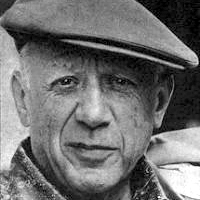Pablo Picasso Frases famosas
“Não se pode fazer nada sem a solidão.”
Nada puede hacerse sin soledad
citado em Punta Europa: Volume 2,Edições 18-24 - página 154, Vicente Marrero Suárez - 1957
Atribuídas
Pablo Picasso frases e citações
Pablo Picasso citado em "Quando a Psicoterapia Trava - Página 69, Marina da Costa Manso Vasconcellos, Grupo Editorial Summus, 2007, ISBN 8571830312, 9788571830318 - 216 páginas
“Não há, na arte, nem passado nem futuro. A arte que não estiver no presente jamais será arte.”
Il n'y a, en art, ni passé, ni futur. L'art qui n'est pas dans le présent ne sera jamais.
Pablo Picasso citado in La Revue de France - Volume 11 - Página 117, Marcel Prévost, Joseph Bédier, Raymond Recouly - La Renaissance du livre, 1931
Atribuídas
“Eu não fiz, vocês é que fizeram, eu só pintei.”
resposta de Picasso.
Conta-se que, em 1940, com Paris ocupada pelos nazistas, um oficial alemão, diante de uma fotografia reproduzindo o painel, perguntou à Picasso se havia sido ele quem tinha feito aquilo. O pintor, então, teria respondido com a frase acima.
Atribuídas
“Quando dizem que sou demasiado velho pra fazer alguma coisa procuro fazê-la em seguida.”
Cuando me dicen que soy demasiado viejo para hacer una cosa, procuro hacerla enseguida.
citado em Psiquiatría geriátrica - Página xxi, Luis Agüera Ortiz, Jorge Cervilla Ballesteros, Manuel Martín Carrasco - Publicado por Elsevier España, 2006, ISBN 8445815792, 9788445815793 - 1048 página
Atribuídas
“A inspiração existe, mas tem que te encontrar trabalhando.”
Cambio 16: Edições 884-887, Informacion y Publicaciones, S. A., 1988
Atribuídas
pergunta de um oficial nazista mostrando uma foto do painel Guernica à Picasso.
Atribuídas
“Cézanne é o pai de todos nós.”
Fonte: Site do UOL, num artigo referente aos 100 da morte de Cézanne http://diversao.uol.com.br/arte/ultnot/2006/01/26/ult32u13181.jhtm, publicado no dia 26 de Janeiro de 2006, às 15h23.
“Copiar outras pessoas é necessário, mas copiar a si mesmo é patético.”
To copy others is necessary but to copy oneself is pathetic
Picasso citado em Nation - Edições 1-33 - Página 64, 1958
Atribuídas
“Se sabemos exactamente o que vamos fazer, para quê fazê-lo?”
Si se sabe exactamente lo que se va a hacer. ¿Para qué hacerlo?
citado em Picasso íntimo: 1971 noventa años, Antonio D. Olano - 1971 - 351 páginas
Atribuídas
Pablo Picasso: Frases em inglês
“It took me four years to paint like Raphael, but a lifetime to paint like a child.”
Quoted in: Peter Erskine, Rick Mattingly (1998), Drum Perspective, p. 73.
Alternative forms:
"At eight, I was Raphael", he used to say. "It took me a whole lifetime to paint like a child"
From Picasso, my grandfather, Marina Picasso (2001).
Attributed from posthumous publications
“Every child is an artist. The problem is how to remain an artist once he grows up.”
Quote attributed to Picasso in TIME, October 4, 1976, Modern Living: Ozmosis in Central Park http://quoteinvestigator.com/2015/03/07/child-art/ http://content.time.com/time/magazine/article/0,9171,918412,00.html
Disputed
Variante: All children are artists. The problem is how to remain an artist once he grows up.
Quoted in: Ingo F. Walther (1996), Picasso, p. 67.
Attributed from posthumous publications
“Art washes away from the soul the dust of everyday life.”
Quoted in: LIFE http://books.google.com/books?id=9EgEAAAAMBAJ&pg=PA9, Vol. 57, nr. 11 (11 September 1964). p. 9.
1960s
As quoted in Life with Picasso, by François Gilot, 1964, p. 60
1940s
“I am always doing that which I can not do, in order that I may learn how to do it.”
Attributed in Civilization's Quotations : Life's Ideal (2002) by Richard Alan Krieger, p. 132, and many places on the internet, this was actually stated by Vincent van Gogh in a letter to Anthon van Rappard http://en.wikipedia.org/wiki/Anthon_van_Rappard (18 August 1885) http://vangoghletters.org/vg/letters/let528/letter.html, also rendered "I keep on making what I can’t do yet in order to learn to be able to do it."
Misattributed
Variante: I am always doing that which I cannot do, in order that I may learn how to do it.
“For me, there are two kinds of women — goddesses and doormats.”
Quoted in: Briton Hadden, Henry Robinson Luce (1969), Time, Vol. 93. p. 66.
1960s
L'art n'est pas chaste [...], on devrait l’interdire aux ignorants innocents, ne jamais mettre en contact avec lui ceux qui y sont insuffisamment préparés. Oui, l'art est dangereux. Ou s'il est chaste, ce n'est pas de l'art.
Quote by Antonina Vallentin (1963 [1957]), Picasso, p. 168.
1960s
“Art is not made to decorate rooms. It is an offensive weapon in the defense against the enemy.”
La peinture n'est pas faite pour décorer des appartements. C'est un instrument de guerre offensive et défensive contre l'ennemi.
La pintura no se ha inventado para adornar las habitaciones. La pintura es un arma ofensiva, en la defensa contra el enemigo.
Les lettres françaises (1943-03-24).
Quotes, 1940's
Yo no busco, yo encuentro. Quoted in Graham Sutherland, "A Trend in English Draughtsmanship", Signature, III (1936), pp. 7-13.
Disputed
Variante: I do not seek. I find.
“Others have seen what is and asked why. I have seen what could be and asked why not.”
Fonte: Pablo Picasso: Metamorphoses of the Human Form : Graphic Works, 1895-1972

1950s
Fonte: Sergei Eisenstein (1957), Film form [and]: The film sense, p. 127.
“It takes a very long time to become young.”
On met très longtemps à devenir jeune.
As quoted by Jean Cocteau The Hand of a Stranger (Journal d'un Inconnu). Horizon Press. 1959 [1953]. http://books.google.com/books?id=HxBJAQAAIAAJ
1950s
